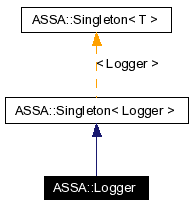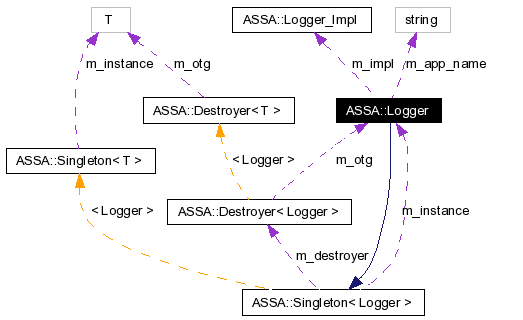
#include <Logger.h>
Inheritance diagram for ASSA::Logger:


Public Member Functions | |
| Logger () | |
| ~Logger () | |
| void | set_app_name (const std::string &appname_) |
| Set application name. | |
| void | enable_group (Group g_) |
| Enable logging for group g_. | |
| void | disable_group (Group g_) |
| Disable logging for group g_. | |
| void | enable_groups (u_long groups_) |
| Enable logging for groups_. | |
| void | disable_groups (u_long groups_) |
| Disable logging for groups_. | |
| void | enable_all_groups (void) |
| void | disable_all_groups (void) |
| bool | group_enabled (Group g_) const |
| void | enable_timestamp (void) |
| Add optional timezone: GMT vs. Local. | |
| void | disable_timestamp (void) |
| bool | timestamp_enabled (void) const |
| void | set_timezone (int zone) |
| 0 - GMT, 1 - LOCAL | |
| void | sign_on (const string &func_name_) |
| void | sign_off (void) |
| int | log_open (u_long groups_) |
| Write log messages to standard output. | |
| int | log_open (const char *logfname_, u_long groups_, u_long maxsize_) |
| Write log messages to the logfile. | |
| int | log_open (const std::string &logsvr_, const char *logfname_, u_long groups_, u_long maxsize_, Reactor *reactor_) |
| Write log messages to the log server assa-logd. | |
| void | log_resync (void) |
| int | log_close (void) |
| int | log_msg (u_long g_, const char *fmt_,...) |
| From vprintf(3S) manpage:. | |
| int | log_func (u_long g_, marker_t type_) |
Private Attributes | |
| Logger_Impl * | m_impl |
| stack< string > | m_context |
| Logger implementation. | |
| std::string | m_app_name |
| Stack of all contexts. | |
Definition at line 45 of file Logger.h.
|
|
Definition at line 48 of file Logger.h. 00048 : m_impl (NULL), m_app_name ("zombie") { /* no-op */ }
|
|
|
Definition at line 49 of file Logger.h. References log_close(). 00049 { this->log_close (); }
|
|
|
Definition at line 196 of file Logger.h. References ASSA::Logger_Impl::disable_all_groups(), and m_impl. 00197 { 00198 if (m_impl) { 00199 m_impl->disable_all_groups (); 00200 } 00201 }
|
|
|
Disable logging for group g_.
Definition at line 153 of file Logger.h. References ASSA::Logger_Impl::disable_group(), and m_impl. 00154 { 00155 if (m_impl) { 00156 m_impl->disable_group (g_); 00157 } 00158 }
|
|
|
Disable logging for groups_.
Definition at line 171 of file Logger.h. References ASSA::Logger_Impl::disable_groups(), and m_impl. 00172 { 00173 if (m_impl) { 00174 m_impl->disable_groups (g_); 00175 } 00176 }
|
|
|
Definition at line 214 of file Logger.h. References ASSA::Logger_Impl::disable_timestamp(), and m_impl. 00215 { 00216 if (m_impl) { 00217 m_impl->disable_timestamp (); 00218 } 00219 }
|
|
|
Definition at line 187 of file Logger.h. References ASSA::Logger_Impl::enable_all_groups(), and m_impl. 00188 { 00189 if (m_impl) { 00190 m_impl->enable_all_groups (); 00191 } 00192 }
|
|
|
Enable logging for group g_.
Definition at line 144 of file Logger.h. References ASSA::Logger_Impl::enable_group(), and m_impl. 00145 { 00146 if (m_impl) { 00147 m_impl->enable_group (g_); 00148 } 00149 }
|
|
|
Enable logging for groups_.
Definition at line 162 of file Logger.h. References ASSA::Logger_Impl::enable_groups(), and m_impl. 00163 { 00164 if (m_impl) { 00165 m_impl->enable_groups (g_); 00166 } 00167 }
|
|
|
Add optional timezone: GMT vs. Local.
Definition at line 205 of file Logger.h. References ASSA::Logger_Impl::enable_timestamp(), and m_impl. 00206 { 00207 if (m_impl) { 00208 m_impl->enable_timestamp (); 00209 } 00210 }
|
|
|
Definition at line 180 of file Logger.h. References ASSA::Logger_Impl::group_enabled(), and m_impl. 00181 { 00182 return (m_impl) ? m_impl->group_enabled (g_) : false; 00183 }
|
|
|
Definition at line 39 of file Logger.cpp. References ASSA::Logger_Impl::log_close(), and m_impl. Referenced by ~Logger(). 00040 { 00041 int ret = 0; 00042 00043 if (m_impl) { 00044 ret = m_impl->log_close (); 00045 delete m_impl; 00046 m_impl = 0; 00047 } 00048 return ret; 00049 }
|
|
||||||||||||
|
Definition at line 230 of file Logger.cpp. References ASSA::Logger_Impl::log_func(), m_context, and m_impl. 00231 { 00232 std::string empty_str; 00233 00234 if (m_impl == NULL) { 00235 return -1; 00236 } 00237 00238 return m_impl->log_func (static_cast<Group> (g_), 00239 m_context.size (), 00240 m_context.size () ? m_context.top () : empty_str, 00241 type_); 00242 }
|
|
||||||||||||||||
|
From vprintf(3S) manpage:. int vsnprintf (char* buf, size_t cnt, const char* fmt, va_list argptr); "The vsnprintf() function returns the number of characters formatted, that is, then number of characters that would have been written to the buffer if it were large enough. It returns a negative value if an output error was encountered." However, mingw relies on WIN32 implementation of the function which is inherently broken (not C99 compliant). From MSD reference: "vsnprint returns the number of characters written if the the number of characters to write is less than or equal to 'cnt'; if the number of characters to write is greater than 'cnt', RETURN -1 indicating that output has been truncated. The return value does not include the terminating null, if one is written. Estimate message size Fromat and write message to the log For extra debuggin if (ret < 0) { va_start (ap, fmt_); vsnprintf (tmpbuf, TMPBUF_SZ -1, fmt_, ap); std::cout << "m_impl->log_msg()=-1 message:\n" << tmpbuf << std::flush; va_end (ap); } Definition at line 144 of file Logger.cpp. References ASSA::Logger_Impl::log_msg(), m_context, m_impl, and TMPBUF_SZ. 00145 { 00146 va_list ap; 00147 va_list ap2; 00148 string empty_str; 00149 size_t expected_sz = 0; 00150 00151 static char tmpbuf[TMPBUF_SZ]; 00152 char* bufp = tmpbuf; 00153 int len = TMPBUF_SZ; 00154 int ret; 00155 00156 if (m_impl == NULL) { 00157 return -1; 00158 } 00159 00162 #if defined(WIN32) 00163 00164 va_copy (ap2, ap); 00165 ret = vsnprintf (bufp, len-1, fmt_, ap2); 00166 va_end (ap2); 00167 00168 if (ret == -1 || ret >= len) 00169 { 00170 len *= 2; 00171 bufp = new char [len]; 00172 while (1) { 00173 va_copy (ap2, ap); 00174 ret = vsnprintf (bufp, len-1, fmt_, ap2); 00175 va_end (ap2); 00176 if (ret > -1 && ret < len) { 00177 delete [] bufp; 00178 break; 00179 } 00180 len *= 2; 00181 delete [] bufp; 00182 bufp = new char [len]; 00183 // std::cout << "Logger::log_func : malloc(" << len << ")\n" 00184 // << std::flush; 00185 } 00186 } 00187 00188 #else /* POSIX, C99 compliant */ 00189 00190 char c; 00191 va_start (ap, fmt_); 00192 ret = ::vsnprintf (&c, 1, fmt_, ap); 00193 va_end (ap); 00194 00195 #endif 00196 00197 expected_sz = ret + 1; 00198 00199 // std::cout << "Logger::log_func : expected_sz = " 00200 // << expected_sz << "\n" << std::flush; 00201 00204 va_start (ap, fmt_); 00205 ret = m_impl->log_msg (static_cast<Group> (g_), 00206 m_context.size (), 00207 m_context.size () ? m_context.top () : empty_str, 00208 expected_sz, 00209 fmt_, 00210 ap); 00211 va_end (ap); 00212 00225 return ret; 00226 }
|
|
||||||||||||||||||||||||
|
Write log messages to the log server assa-logd.
Definition at line 77 of file Logger.cpp. References ASSA::Connector< SERVICE_HANDLER, PEER_CONNECTOR >::connect(), ASSA::AutoPtr< X >::get(), m_impl, ASSA::Connector< SERVICE_HANDLER, PEER_CONNECTOR >::open(), and ASSA::AutoPtr< X >::release(). 00082 { 00083 { 00084 TimeVal tv (10.0); 00085 INETAddress addr (logsvraddr_.c_str ()); 00086 if (addr.bad ()) { 00087 return -1; 00088 } 00089 00090 Connector <RemoteLogger, IPv4Socket> log_connector; 00091 AutoPtr<RemoteLogger> lsp (new RemoteLogger); 00092 log_connector.open (tv); 00093 00094 if (log_connector.connect (lsp.get (), addr) < 0) { 00095 delete m_impl; 00096 m_impl = NULL; 00097 return -1; 00098 } 00099 00100 m_impl = lsp.release (); 00101 } 00102 int ret = m_impl->log_open (m_app_name.c_str (), logfname_, 00103 groups_, maxsize_, reactor_); 00104 return ret; 00105 }
|
|
||||||||||||||||
|
Write log messages to the logfile.
Definition at line 66 of file Logger.cpp. References ASSA::Logger_Impl::log_open(), and m_impl. 00067 { 00068 if (m_impl != NULL) { 00069 return -1; 00070 } 00071 m_impl = new FileLogger; 00072 return m_impl->log_open (logfname_, groups_, maxsize_); 00073 }
|
|
|
Write log messages to standard output.
Definition at line 53 of file Logger.cpp. References ASSA::endl(), ASSA::Logger_Impl::log_open(), and m_impl. 00054 { 00055 if (m_impl != NULL) { 00056 std::cerr << "Logger::log_open - Implementation already exist" 00057 << std::endl; 00058 return -1; 00059 } 00060 m_impl = new StdOutLogger; 00061 return m_impl->log_open (groups_); 00062 }
|
|
|
Definition at line 239 of file Logger.h. References ASSA::Logger_Impl::log_resync(), and m_impl. 00240 { 00241 if (m_impl) { 00242 m_impl->log_resync (); 00243 } 00244 }
|
|
|
Set application name. This should be the first call made to the newly created Logger object. Definition at line 55 of file Logger.h. References m_app_name. 00055 { m_app_name = appname_; }
|
|
|
0 - GMT, 1 - LOCAL
Definition at line 230 of file Logger.h. References m_impl, and ASSA::Logger_Impl::set_timezone(). 00231 { 00232 if (m_impl) { 00233 m_impl->set_timezone (zone_); 00234 } 00235 }
|
|
|
Definition at line 255 of file Logger.h. References m_context.
|
|
|
Definition at line 248 of file Logger.h. References m_context. 00249 { 00250 m_context.push (func_name_); 00251 }
|
|
|
Definition at line 223 of file Logger.h. References m_impl, and ASSA::Logger_Impl::timestamp_enabled(). 00224 { 00225 return (m_impl) ? m_impl->timestamp_enabled () : false; 00226 }
|
|
|
Stack of all contexts.
Definition at line 130 of file Logger.h. Referenced by set_app_name(). |
|
|
Logger implementation.
Definition at line 129 of file Logger.h. Referenced by log_func(), log_msg(), sign_off(), and sign_on(). |
|
|
Definition at line 128 of file Logger.h. Referenced by disable_all_groups(), disable_group(), disable_groups(), disable_timestamp(), enable_all_groups(), enable_group(), enable_groups(), enable_timestamp(), group_enabled(), log_close(), log_func(), log_msg(), log_open(), log_resync(), set_timezone(), and timestamp_enabled(). |
 1.4.6
1.4.6